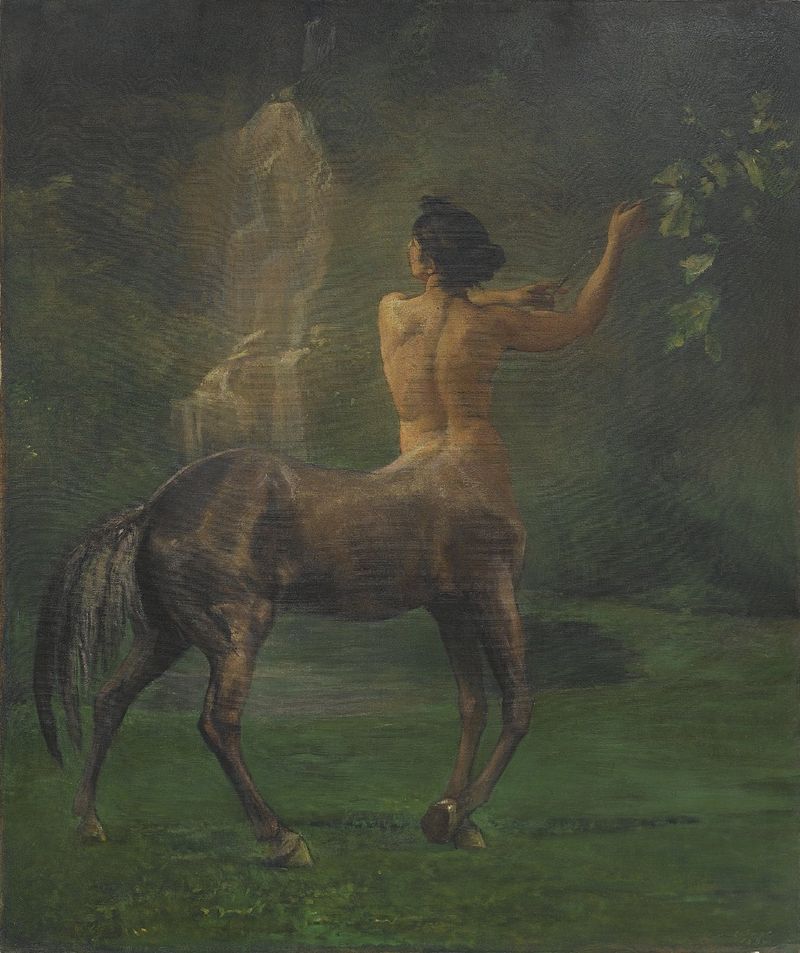If you love Greek mythology, horses, Scotland, or The Chronicles of Narnia, here is a post dedicated to oatcakes. If -like me- you are celebrating your birthday around these days, you may also like the recipe. But first, a little bit of history:
Scots, horses and Centaurs
Oatmeal bread & crackers have been popular in Scotland for centuries and we all know that horses also feed on this grain. (I'm not suggesting, of course, that Scottish people eat horse-food even though at least one distinguished Scotsman has made the comparison, in favor of both categories.) Whether mythical Centaurs -that were 50% equine- also liked oats is uncertain. Nothing is said in Greek myths about their diet but it's possible they ate the same food as men. These odd creatures entered the scene by winning a battle against the Lapiths, after which there are fewer stories about the category and more about one particular Centaur. Of course, there were also female Centaurs, the Centauresses -like the ones we meet in Prince Caspian: The Return to Narnia (1951), where all Centaurs are honorable, wise, and friendly. In Greek mythology, however, Centaurs would behave more like animals than humans -just like Satyrs and Fauns.
 |
| Centauress by John La Farge, 1887 (The Brooklyn Museum Collection) |
What did mythical Centaurs eat?
Mythical Centaurs lived in east-central Greece, in the regions of Magnesia and Thessaly. The first is dominated by Mt. Pelion, where the sage Chiron lived. The second is flat, typically a region of horses, and was co-ruled by the family of Achilles, Chiron's pupil. (Nearly every Greek mythical king or hero and even some gods or demi-gods had been instructed by this remarkable Centaur. Unfortunately, not much is said in Greek epic tales, like the Iliad in which Achilles is the main protagonist, about the nutrition of young heroes -or Centaurs.) Oats must have been a rare commodity on Mt. Pelion, where all sorts of herbs grew naturally, among other things. Even today, the mountain is covered in oak, chestnut & apple trees. Thessaly, on the other hand, was and still is the largest agricultural region in Greece. So, yes, mythical Centaurs from that area would probably have access to oats, barley and wheat.
From Turkish delight to oaten cakes
Even though C. S. Lewis imagined his own Centaurs living in forests, Narnian territory also included plains and fields where its strange creatures would find or cultivate grains. He also created his fantasy world so as to entertain his young readers, besides instructing them. That's why Narnian food was or should be delicious: butter, honey and other delicacies used in children's favorite snacks (including the notorious Turkish delight) were readily available. When Prince Caspian joined the Narnians, he was given some oaten cakes that were nutritious and wholesome if not so good as other treats might be: "As
it was now past the middle of the day, they rested with the Centaurs
and ate such food as the centaurs provided - cakes of oaten meal, and
apples, and herbs, and wine, and cheese." (The Chronicles of Narnia, Book 2, Chapter 6). So Narnian Centaurs ate both horse-food and men's food and their cakes were best enjoyed with apples or cheese, just like Scottish oatcakes.
OATEN CAKES
This recipe was created from scratch with ingredients that would have been available to Narnian Centaurs (plus a tiny amount of salt).
I n g r e d i e n t s
275g rolled oats
1/4tsp salt
25g cold butter
1tbsp honey
120ml lukewarm water
M e t h o d
Preheat the oven to 200C. Process 225g of the rolled oats into coarse flour. Combine with the rest of the oats and the salt. Rub in the butter until crumbs are formed. Mix honey and water, then pour over the dry ingredients. Gather into a ball and place on a hard surface. Roll out the dough, about 3-4mm thick. Cut out discs with a glass. Arrange on a non-stick baking pan and bake on the lower rack for 20 minutes, until light brown. Leave in the cooling oven until they are firm.
V a r i a t i o n s
To make traditional oatcakes: Process all of the rolled oats. Leave out the honey. Double the amount of salt, if liked.

Comments